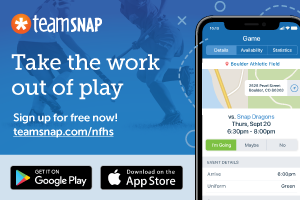
Getting evaluated can be a positive or negative experience depending entirely on how you approach the evaluation.
The very first formal evaluation I received as a lacrosse official was in 2010 at a training clinic at UNC-Chapel Hill. I went into the clinic with an overly-confident attitude and I displayed an inability to change my game according to the feedback I received by the evaluators. I went through the three-day clinic thinking I was showing everybody how the game was supposed to be officiated, but I was showing a lack of desire for improvement. When I received my written evaluation, I expected to hear that I was a promising young official who had an uncanny knack for making the right calls.
Instead what I got back was that my positioning was truly awful, my foul threshold was more appropriate to a U11 game than a high school game, my signals were all over the place and were done so fast that no one had a clue what I called, and that I showed an unwillingness to accept criticism. I read the evaluation with growing anger towards the clinicians until I got to the very last comment, which read:
“When Gordon is on the field, he behaves as if everyone showed up to the game to watch him officiate and not the players.”
Yeah, that one hurt.
I almost quit officiating after reading that last sentence. For a whole month, I reread my evaluation and tried to understand how I gave off the impression that I was unwilling to learn and wanted to be the center of attention in a profession that prefers to be forgotten after the game. Eventually, I chose not to remain angry at the clinicians for doing their job in pointing out to me the unpleasant details of my lackluster officiating skills and outward demeanor. I chose to work on what I could change immediately while making a sincere effort to be open to any criticism I received from any official more experienced than me (which at the time was pretty much everyone in the association).
I spent that offseason getting into the right position for every play and making my signals as clear as possible. I also began actively seeking out the more experienced officials to ask them questions and reading any book on officiating that I could find. I showed that I was eager to learn and adjust my game by immediately correcting my mechanics whenever I was told I was doing something incorrectly.
My first real evaluation was awful because I went into it thinking I knew everything after officiating for two years. My first reaction to being told I was not a good official was to blame the clinicians. I could have continued in my anger and remained at the same level I was back in 2010, but I chose to adjust my attitude and realized that the evaluators did their job. They told me I wasn’t very good and it was up to me to work on every aspect of my game until I could earn a good evaluation.
Getting evaluated isn’t about being perfect or making the right calls because you are going to screw up and you’ll miss a call or two. Getting evaluated is about keeping a learning attitude and demonstrating that you can adjust your game to what the clinicians tell you.
Gordon Corsetti
Gordon Corsetti is an official for the Georgia Lacrosse Officials Association and writes the AYL blog – click here and has written his first book – “Advancement Rules:Improving your lacrosse Officiating“.
Most Recent Articles
- nfhs news NFHS Learning Center Unveils School Honor Roll Program
- NFHS Network Contact Information
- nfhs news Shout-out to Health-Care Workers and State High School Associations
- state news Stadiums Across Colorado Light Up to Show Support for Students
- gymnastics-girls article ‘They became a family’: How New Castle gymnastics qualified for state for first time since 2002



